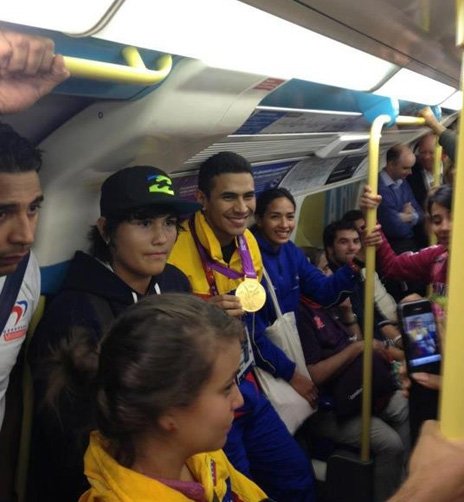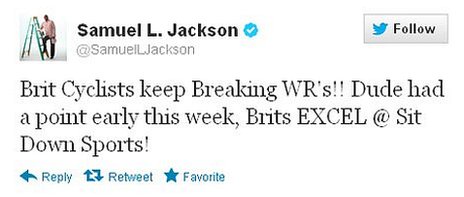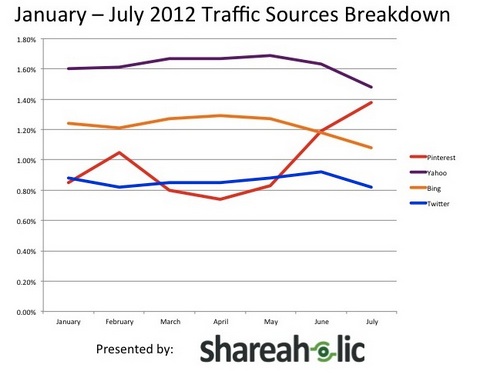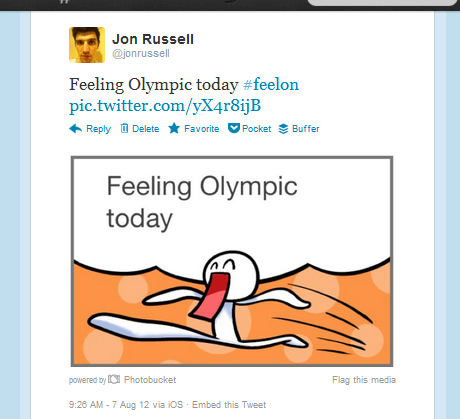We Are Social Asia Tuesday TuneUp #41
Marketers yet to figure out Social ROI
According to Lighthouse Research’s latest marketing trends report, an overwhelming number of marketers in Singapore that currently utilise social media marketing do not have a system in place to measure social media marketing ROI. The survey reached out to 1,256 Singapore-based client side marketers, out of which 71% said they do not have a methodology in place to measure their social ROI. While there is an 8% increase in marketers using social media for their brands, more than half of them said they lack understanding of how to effectively measure the return. Moreover, 49% said they do not have the capacity to measure it. Given that brands are investing more in their social media activities, they should definitely be putting in more effort to set metrics in place to measure their social ROI, lest it proves unaccountable.
The social Olympics review: It’s a record breaker!
It was billed and prepped as the pinnacle of social media usage, and London 2012 certainly lived up to the expectation with more than 150 million tweets being posted within a span of 16 days. The height of activity came during the Closing Ceremony with the Spice Girls and Take That aiding more than 116,000 tweets per minute. With regards to sporting coverage, unsurprisingly, Usain Bolt’s electric 19.32-second 200m sparked 80,000 tweets per minute, which beat his 100m performance at 74,000 tweets per minute. Bolt was joined by Michael Phelps, Tom Daley and Andy Murray in a top 10 list of Olympians garnering more than 1 million tweets during the games:
- Usain Bolt (@UsainBolt)
- Michael Phelps (@MichaelPhelps)
- Tom Daley (@TomDaley1994)
- Ryan Lochte (@ryanlochte)
- Gabby Douglas (@gabrielledoug)
- Andy Murray (@andy_murray)
- Kobe Bryant (#GetKobeOnTwitter)
- Yohan Blake (@YohanBlake)
- Lee Chong Wei (@Lee_C_Wei)
- LeBron James (@KingJames)
As the host of the Games, Team GB had plenty to brag about as there were over 5.2 million mentions of the top 10 GB athletes during the Games, with the althletes also showing impressive follower growth. Leading the way was diver Tom Daley (@TomDaley1994) with 1.15 million followers, 800,000 of those were recruited during the Games. Swimmer Rebecca Adlington (@BeckAdlington) saw an astonishing 336% increase in her follower numbers, the most improved athlete in this category.
The Social Games has also been groundbreaking for the sharing of special Olympic moments, such as the Venezuelan gold medalist travelling home on the Tube. A number of people seem to have spotted him – this picture was tweeted by the comedian Omid Djalili, another by Chris Scanlan who said: “We had a fiesta in the carriage and had pictures taken with the gold medallist, it was an amazing atmosphere.”

Samuel L. Jackson almost stole the stage with his take on the events on London 2012.

With all this talk about Twitter and Facebook, China’s Sina Weibo dwarfed the scene in the West throughout the Olympics period with a significantly higher volume of online conversations. According to an infographic from Sina, Sina Weibo users sent a total of 393 million messages about the Olympics, recording twice as many Olympics-related messages during the games as Twitter did. While one explanation given for this higher activity is that comments on posts can be added into one’s Sina Weibo news stream, this is still a significantly huge number from China. Hitwise’s numbers show that Sina had the most visitors to its Weibo service over the 17 days of the Olympics with 310 million visits. Tencent came in a distant second with 200 million, followed by Sohu with 120 million and Netease with 40 million. Sina Weibo also saw 20 million posts in 5 minutes, after Chinese hurdler Liu Xiang took a tumble making him one of the most discussed athletes alongside swimmers Sun Yang and Ye Shiwen, and gymnast Feng Zhe.
Weibo Bridge for Weibo power users
Chinese startup Weibo Bridge is trying bridge the gap between advertisers and social media influencers. The service essentially matches advertisers with weibo power users – for both Sina Weibo and Tencent Weibo – who are willing to post ads for money. Any weibo user can sign up for Weibo Bridge, which will analyse the influence of the user, by certifying a minimum follower base of 2,000 active followers to ‘qualify’. Users are then recommended to advertisers based on the specific needs of the campaign. Despite its new arrival, the site claims to have more than 12,000 weibo accounts with more than 1.6 billion total followers (of course, some of these users have the same followers so they might have been counted multiple times) for marketers to tap on.
Japanese Twitter app Feel On craze
Feel On, the app that adds comic book craziness to tweets and Facebook updates with colourful animations, has now extended its presence to both iPhone and Android devices. The Tokyo-based developer has already seen 400,000 copies sold in Japan and it is now available across 139 different countries. Its attempt to create a visual novel is certainly commendable. If you are a fan of Asian animations and comics, this is for you to add variations to your tweets.
Facebook World Hack comes to Asia
Facebook is travelling to 10 cities all around the world for its World Hack end of this month. Three of the ten cities on the tour include Taipei, Jakarta and Bangalore. Each city-stop will be a day-long coding event where new social apps, APIs and mobile SDKs will be developed. It is after all the biggest social networking site and needless to say, winning apps will be greatly rewarded. Facebook is tapping onto such crowdsourced talent in its attempt for continuous improvement.
Pinterest continues to grow
According to Shareaholic, referrals from Pinterest are growing at a steady rate. As a measure of where Pinterest currently stands, it drives more traffic to sites operating Shareaholic than Twitter and Bing and it’s only 0.10% away from overtaking Yahoo:

Google+ doesn’t appear in Shareaholic’s graphs, but it accounted for a minuscule 0.06% of its referral traffic last month, as opposed to Twitter’s 0.82%, Pinterest’s 1.38% and Facebook’s 6.06%.
G+ social shares lowest compared to Facebook, Twitter and even LinkedIn
Umpf has produced some quite damning, although not exhaustive, research on Google+ activity. They analysed 100 random online entertainment, health, business, technology and general news stories and looked at how many times each story was shared by Facebook, Google+, LinkedIn and Twitter users:

Facebook gambles on it’s future
Having come under increasing pressure from Wall Street in the last month, in what could be seen as a desperate attempt to generate revenue, Facebook have opened their doors to its first real-money gaming app: Bingo Friendzy Due to regulatory issues, it’s only been launched in the UK so far, so using Facebook’s age-gating and geo-location technology, Bingo Frenzy and its corresponding News Feed stories will not be visible to users under 18 years old or anyone outside of the UK.
Bingo Friendzy has been made in a partnership with Gamesys, one of the UK’s biggest online gambling providers. The British company will make the games as part of its arrangement with Facebook and the social network will promote them.

Facebook analytics gets better with fan and non-fan post impressions
Facebook is adding four new metrics to Insights that give Page owners a better understanding of their audience. It is now possible to see differences in Page views between fans and non-fans in reference to both normal and paid impressions. This feature was requested by our very own Jamie Robinson, We Are Socials’ Research & Insight Director, this week on Econsultancy. Co-incidence? We think not…
Facebook optimises ad tool
Facebook has taken steps to make their sponsored ads more accessible for a wider-audience by simplifying their self-service ad tool. The change simplifies the ad-creation process and by automatically creating Sponsored Stories to run along with traditional ads, Facebook can get more of these social ads in the system. As targeting options and ad types are getting increasingly complicated, this is an important change for Facebook in appealing to smaller businesses.

Facebook looks for mobile revenue boost
Facebook have begun to roll out the option for advertisers to promote their mobile apps. The promoted app will surface as a recommendation alongside apps that are being recommended organically based on a user’s history and social graph under the headings “Try These Games” and “Try These Apps”, but will be flagged with the text “sponsored.” Like any other ad, it can be targeted to users based on age, gender, location, likes and interests. These ads will aim to result in an installing of the application and work on a ‘cost-per-click’ structure.
Australia rules that user comments on Facebook pages should be regulated
Last month Australia’s advertising industry watchdog issued a judgment in which it said comments made by ‘fans’ of a vodka brand’s Facebook page were ads and must therefore comply with industry self-regulatory codes, and therefore consumer protection laws. This puts the onus on brands in Australia to moderate comments from fans, but also puts Australia’s regulators at odds with the rest of the world. For example, the UK’s Advertising Standards Authority has previously made it very clearthat their rules explicitly don’t cover comments from members of the public unless marketers include them in their own material. For example, in terms of the ASA regulations, marketers only need worry about what they’re saying on their Facebook page, campaign blog or community, not what members of the public do or say.
Topshop lives up to its ‘top’ billing on social
Of the UK’s top 100 retailers, Topshop holds the top slot for fans on both Facebook and Twitter, according to new research from eDigitalResearch. Although big numbers aren’t everything, Topshop has the highest ‘Talking About’ number on Facebook of the retailers group as well.
Going on the hunt for Expedia’s ‘Tag Me if You Can’
Back in Australia, our We Are Social team down under have helped launch Australia’s largest online gamification project for Expedia called ‘Tag Me If You Can’. Sounds like a challenge. The goal? Tag Nathan Jolliffe of ‘The Amazing Race’ and ‘Celebrity Apprentice’ fame in 15 secret locations around the world, which he reveals through clues in videos to win a share of $150,000. We’re dusting off our maps and geography books already…

How brands should react to be brand jacked
Maybe there does come a time to grow up, and those spoof Twitter accounts just aren’t cutting it anymore. Northcliffe, the regional newspaper division of British publisher DMGT, took legal action in the US to unmask a persistent anonymous Twitter impersonator of its chief executive, alleging criminal behaviour. But such heavy-handed actions can sometimes backfire. The press attention added hundreds more to the offending account’s followers, and DMGT has since dropped the case. Robin Grant, We Are Social’s Global MD, told the Financial Times:
The brand’s response can be the trigger for a crisis. Brands need to show that they’re listening and respond in a human way
And maybe being human means ignoring it? That’s what Shell has done to Greenpeace’s latest PR stunt called Arctic Ready, and although Greenpeace’s work has made a small splash, it definitely hasn’t had the lasting harmful effects on the brand that some of Greenpeace’s other campaigns have.
